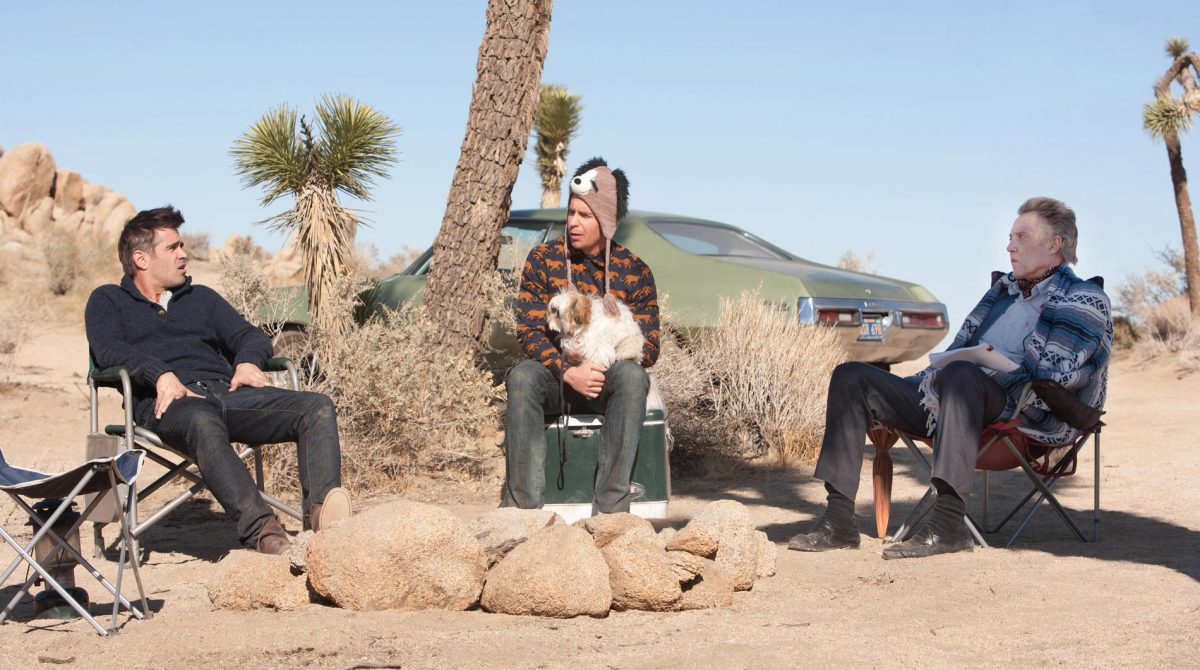 (3.5 / 5)
(3.5 / 5)
Hans: As Gandhi said…’An eye for an eye leaves the whole world blind’. I believe that wholeheartedly.
Billy: No, it doesn’t. There’ll be one guy left with one eye. How’s the last blind guy going to take out the eye of the last guy left whose still got one eye left? All that guy has to do is run away and hide behind a bush. Gandhi was wrong. It’s just that nobody’s got the balls to come out and say it.
That one exchange would seem to sum up Seven Psychopaths, the new absurdist, quasi-philosophical offering from Martin McDonagh, award-winning playwright and director of 2008’s In Bruges.
Seven Psychopaths is the story of Marty (Colin Farrell), an Irish émigré struggling to finish his new screenplay amidst the Hollywood Hills. He may also have an alcohol problem. His manic best friend, Billy (Sam Rockwell), makes a living kidnapping dogs and returning them for profit, along with his partner, the offbeat Hans (Christopher Walken).
However, when Billy kidnaps a pooch belonging to unstable gangster Charlie (Woody Harrelson), all bets are suddenly off. Psychos start appearing in Marty’s life, though not necessarily the ones you think, and soon it seems it’ll be less of a problem mustering the inspiration to finish his film than simply surviving the day.
Seven Psychopaths is a far more sprawling, arguably ambitious offering than In Bruges. The superlative cast is in place, though there’s arguably no single performance to match Ralph Fiennes’ profane, childlike Harry in McDonagh’s directorial debut. During the Q&A after the screening – which I will get to later – McDonagh referred Bruges as a fairy-tale place, seemingly without recalling Harry’s identical description in the eponymous film. There’s a lot of McDonagh in his work.
Indeed, Marty – at one point specifically referred to as Martin – would seem to be very much a surrogate for the writer-director. The concerns he mentions in trying to write Seven Psychopaths, his own project within the film of the same name, would seem to mirror McDonagh’s own.
As I’ve said, the ensemble is great. Zelijko Ivanek returns for a bit part as one of Charlie’s henchmen, a bigger but less pivotal part than In Bruges. Carter Burwell is once more on scoring duties and much of the crew has been carried over, too. If McDonagh is assembling his own troupe, in the vein of Wes Anderson or Orson Welles, then it’s a worthy one.
Seven Psychopaths, apparently written at the same time as In Bruges, wouldn’t necessarily work as a first film. It requires an understanding of the writer’s dark, twistedly comic oeuvre. If psychopaths are to McDonagh what identity crises are to Charlie Kaufman, then Seven Psychopaths is arguably McDonagh’s Adaptation.
As a writer of gangster films, McDonagh is fully familiar with the conventions of the genre, and both uses and subverts them here. When the freewheeling Billy exclaims his intention to take the bad guys on in a shootout in the desert (with the exasperated Marty clarifying, “What do you think we should to do in real life?!”), you can tell what way the film is going.
Marty/McDonagh claims he is sick of Hollywood psychopath movies – he doesn’t want guns or violence; indeed, he claims to be a pacifist – but that’s the type of film he finds himself writing, almost against his will. Seven Psychopaths is perhaps, then, an attempt for McDonagh to have his cake and eat it.
Within the structure of the movie, there are numerous flights of fantasy involving psychopaths who may or may not be of Marty’s creation, among them a Buddhist/Amish/Quaker psychopath (played in part by Harry Dean Stanton), and a serial killer killer (Tom Waits). McDonagh apparently concocted several of these sequences as part of a collection of short stories, others of which contributed to his Olivier Award-winning play The Pillowman. In less capable hands, the whole thing might come across as piecemeal, but, even with trips to war-era Vietnam and the home of the Zodiac killer, Seven Psychopaths is a mostly coherent whole.
With no strong female characters, apart from perhaps Hans’ ailing wife, McDonagh gets in a couple of in-jokes about “Marty’s” terrible writing of women. The film is very funny, often morbidly so, with, as in In Bruges, little impact on the emotional content.
It may never scale the heights of its predecessor (in case of Ken’s agonized ascent, literally so) – the jokes in Seven Psychopaths come thick and fast, most of them from Billy or the deadpan Hans, so it becomes difficult to keep track of them till they pop up again. And, indeed, they frequently do pop up again in unexpected places, like the bunny that accompanies Tom Waits’ subdued maniac. It’s a poppy film, but not unsatisfying for it.
If Quentin Tarantino’s early work seemed self-aware then Seven Psychopaths is borderline neurotic. It’s clever, madcap, sometimes strangely touching. If this constitutes McDonagh’s purgation of any desire to write about the type of characters that have so far defined his film career – weird, mixed-up, well meaning and otherwise –it’ll be a shame, but perhaps McDonagh has gone as far as he can or wants to with them. Having announced his desire to return to theater, at least for a short time, I eagerly await his next offering.
Paulo: Put your hands up!
Hans: No.
Paulo: But I’ve got a gun.
Hans: I don’t care.
Paulo: That doesn’t make any sense!
Hans: Too bad!
